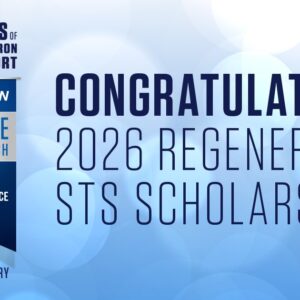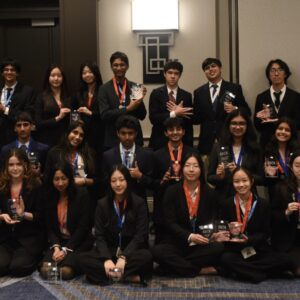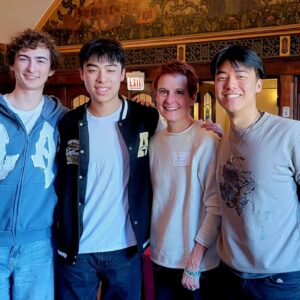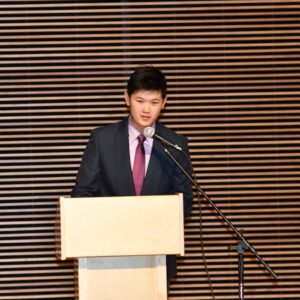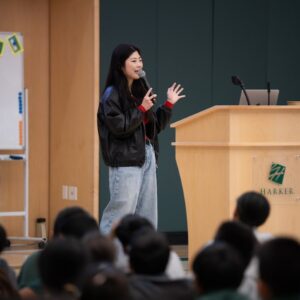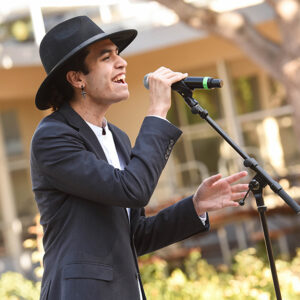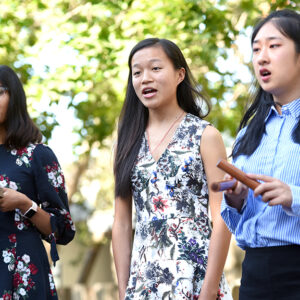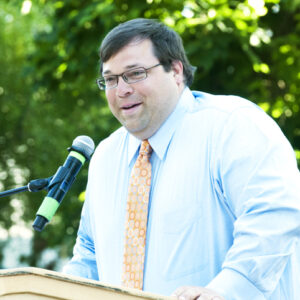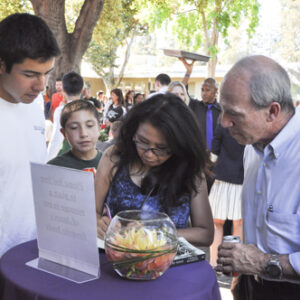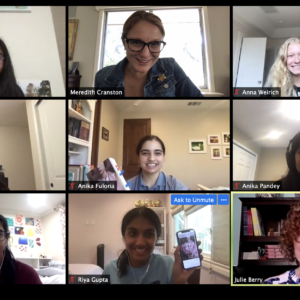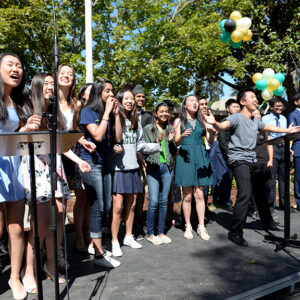This article originally appeared in the fall 2013 Harker Quarterly.
Good morning. I would like to welcome the entire community, and in particular the classes of 2017, 2016, 2015 and 2014 to this year’s matriculation ceremony, a tradition that we as a community have practiced since the inaugural year of the upper school in 1998. I would also like to dedicate today’s ceremony to the memory and example of Jason Berry. The original theme of my talk was gratitude, which I believe still fits, as I am sure Mr. Berry would want us to be grateful for what we have and those who surround us. He would want us to have the best year possible.
In the early years of the upper school, when we were a smaller school, we bused the entire community to Villa Montalvo and in that lovely setting committed ourselves to the values expressed in the matriculation oath. Now we take the matriculation oath here, in what is affectionately known as the quad, tying together the values of the oath and the campus where we will honor those values.
The matriculation oath itself, though born with the upper school in 1998, reflects values dear to The Harker School since its founding by Frank Cramer in 1893 as Manzanita Hall. Lifelong learning, well-rounded programs, character and community have been the school’s mission since its beginning. We owe our gratitude to all of the students, teachers, staff and administrators who dedicated themselves to this school and its values over its long history. We are a reflection of their work; we hope to be what they hoped for; we owe it to them to carry the promise forward.
Today I am grateful for a video on gratitude sent to me by Harker parent Claude Cartee. The creator of the video, Dennis Prager, states that both goodness and happiness depend upon gratitude. He says that there has never been an ungrateful happy person in the history of humankind. By this logic it may be safe to assume that there has never been an ungrateful good person as well. We can only know this a priori of course. I am grateful I finally had an opportunity to use the phrase “a priori” in a speech.
I am also grateful for the opportunity I had this summer to travel to Tanzania with 11 wonderful students – Alyssa, Logan, Jonathan, Monica, Namrata, Lea, Shazdeh, Kenny, Parth, Raymond, Callie – and three adults – Dr. Dhoran, Dr. Kamins, and our own Ms. Anita Chetty, the true visionary of the trip. To commemorate the trip I am wearing my Tanzanian tie, a gift from the students, sporting the country’s colors, and made with small beads in the style of the Masai tribe’s traditional handicrafts. Allow me to indulge in a few inside jokes: the journalism jeep by far had the most swag; there were numerous Parth sightings; we found a Chipotle in Arusha; a leopard is difficult to “spot”; some of the big cats were “lyin’” around on the Serengeti.
This was a groundbreaking trip for Harker in many ways. It was the school’s first trip to sub-Saharan Africa, and the half-day eye clinic with the Masai tribe was our first direct service in Africa. 2013 saw another groundbreaking trip: the business and entrepreneurial trip to India. Harker students and faculty, with trips like these, are carrying on a long tradition of global citizenship, initiated in 1992 with the trailblazing exchange between the Tamagawa School in Tokyo, Japan, and The Harker School. Harker students were on five continents in this past summer alone, realizing the vision of fostering global citizenship that longtime head of school and current board chair Diana Nichols had for many decades.
I am grateful for witnessing our students’ willingness to serve during the eye clinic for the Masai villagers. Many Masai showed up to be tested for and potentially receive eye glasses that improved their near vision. We had Masai elders attend who most likely never had an eye exam or even a health exam, outside of what their traditional herbalist could offer. At the end of the clinic the elders of the Masai tribe were gathering in front of the school wearing their glasses. One 80-year-old grandmother sported a black pair of glasses with the word “sexy” written on the frame. It was heartwarming to watch our students set up their stations and get to work without complaint, like they had been working for the U.N. for years. The students also donated 15 goats to the village.
This same sense of service drove the students to raise funds to purchase books and deliver them to a village school outside Arusha. We met with the principal and the board chair of the school on a Saturday to give them the books. The principal said the books will propel his school to new heights. In a world where we can download “Moby Dick” on our cell phones while waiting in the grocery line, his students have just one book per 17 students. The school of almost a thousand students has just 14 teachers. Classes have close to 100 students in them.
The principal wanted to pass on a message to our students. He urged Harker students to take full advantage of their educational opportunities, to listen to their teachers and work hard. I deliver his message not because I doubt you will follow it or because I think you need reminding of the principal’s advice. I repeat his message for him, because I know that he would want to know that we have true gratitude for the rich academic and personal experience this community offers and that we do not take it for granted. I believe we owe it to him and his students to remind ourselves to be grateful for all we have.
This talk is perhaps not much more than the equivalent of what we used to hear from our parents at dinner: eat your vegetables because they are starving in Africa. I guess I am saying appreciate your books, your eyesight, your community, because not everyone is as fortunate as we are. There is one difference though, and that is the following: now we are hearing the same advice from real people who care that we care, and whom our students have directly met due to our global outreach.
Thich Nhat Hanh, the Vietnamese Zen master, has said that we do not stop to be mindful of the miracle of our eyes, our ability to walk, our loved ones around us. I have often said that the world isn’t looking for more smart, evil people. The parts of our mission that speak to kindness, respect and global citizenship are as important as any, and our students are reflecting these values locally and globally every day. But it starts with gratitude, and that is what I wish for you this year. Thank you.

